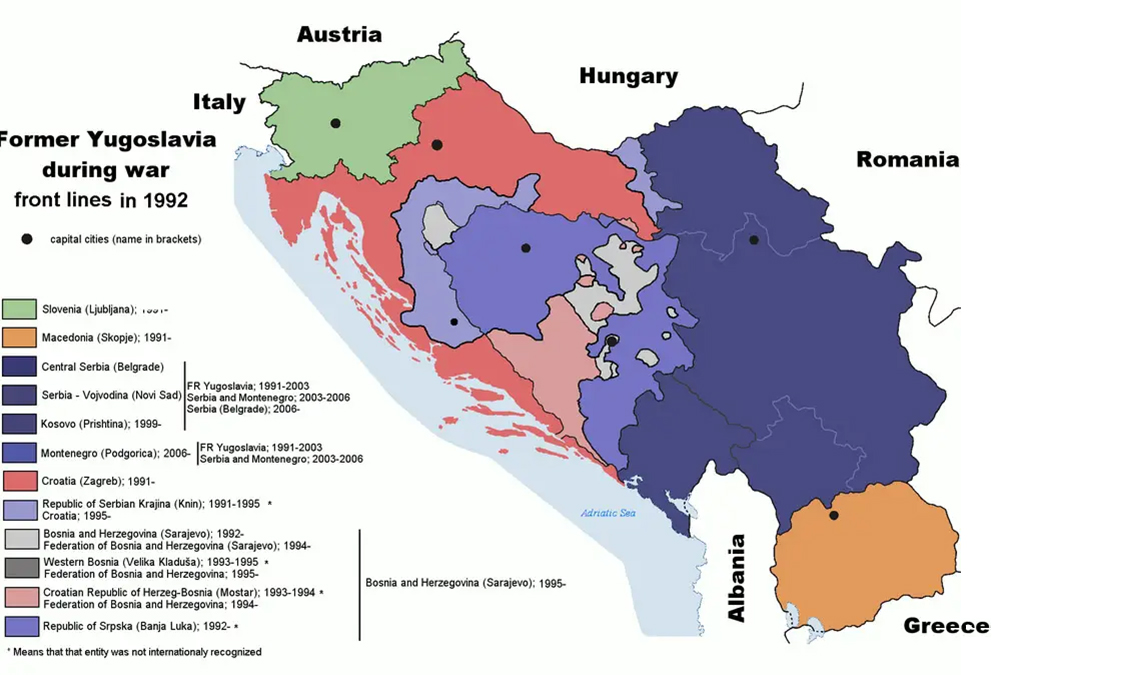When imperialism moved in to smash up the former socialist federation of Yugoslavia, it seemed that, with the Soviet Union gone, a unipolar world with the USA at the helm was there for the taking.
It seemed a simple task to revive ethnic tensions, stir up bloody civil wars, break up the federation and leave in its place a ragtag collection of small, weak states ready to cooperate with the west to the detriment of their own people.
Even back then, the US was taken aback by the degree of resistance aroused by this hooliganism. And now that the US is up to its old tricks in the Balkans, putting pressure on Bosnia to join the warmongering Nato alliance, it is finding that its hegemonic aspirations are under challenge in a multipolar world.
The Dayton Accords
The Dayton Accords, the peace deal which concluded the Bosnian civil war in 1995, established two autonomous entities within Bosnia: one for the muslims and Croats (Federation of Bosnia-Herzegovina) and another for the Serbs (Republika Srpska). Although there was also established a tripartite presidency reflecting the three main ethnic groups, many of the powers normally exercised by government were provisionally vested in the so-called Office of the High Representative (OHR), a body authorised by the United Nations.
These arrangements were supposed to be transitional, lasting maybe two or three years, after which Bosnia would exercise full national sovereignty.
Twenty-five years later, the OHR not only continues to exist but has granted itself numerous additional powers, passing some 140 laws, all imposed with no democratic mandate. Whilst the accords were effectively a colonial imposition from the outset, a hypocritical pretence of nation-building framed in the context of the imperialist balkanisation of socialist Yugoslavia, at least they appeared to guarantee the bare national rights of Bosnian Serbs within Bosnia.
Bosnian Serbs had fought long and hard to keep Bosnia within Yugoslavia. When this failed, they fought to stay in Yugoslavia themselves by seceding from the secessionist Bosnia. Only when faced with the disintegration of Yugoslavia did they fall back on their final option: to be stuck inside a Bosnia in which they were at least to be recognised as an ‘autonomous entity’.
But even this dubious achievement did not last long, as Glenn Diesen, a professor at the University of South-Eastern Norway, explains.
“Once the European Union had asserted near-colonial control over Bosnia, the purpose of these powers changed as the OHR began transitioning ‘from Dayton to Brussels’. The EU argued that Bosnia could only be stable and peaceful if it became a member of the bloc, and to qualify to join, Bosnia had to dismantle the autonomous entity system and centralise power in Sarajevo.
“The EU has made it clear it will not return sovereignty to Bosnia until the country ‘is a peaceful, viable state on course to European integration’.” (The EU empire: Brussels has kept Bosnia on a leash for decades by Glenn Diesen, RT, 14 October 2021)
In other words, Bosnia cannot enjoy full sovereignty until it fully embraces its vassal status within a unipolar world where all the shots are called by the EU and Nato. It can only gain sovereignty when it has relinquished it!
But the Republika Srpska’s president, Milorad Dodik, has so far staunchly resisted the pressure to tuck in behind Nato, which is why he has suddenly become the villain in the western story. Whilst Bosnia-Herzegovina has jumped through a number of hoops towards Nato membership, the Republika Srpska has declined, preferring instead to withdraw its forces from the federal military, as befits an ‘autonomous entity’.
It is imperialist frustration at the refusal of Republika Srpska to abandon its autonomous status, give up the fight for full Bosnian sovereignty or have any truck with Nato that has now spilled over into a campaign of vilification against Dodik.
Out of the blue, in an arbitrary move cynically calculated to enflame ethnic tensions within Bosnia, the departing ‘high representative’ imposed a law making it a crime to deny that genocide had taken place at Srebrenica. By abruptly raising the historical issue of the Srebenica events in this way, with no supporting context, the sole intent was to demonise the Serbs.
Dodik called for the law to be repealed, or, failing that, to be extended to include the murder of Serbs by pro-Nazi Bosnian-Croatian forces at the Jasenovac concentration camp during World War Two, restoring all these events to their historical context.
Had the attempt to impose this law been motivated by any desire to achieve truth and reconciliation, Dodik’s constructive compromise would have been welcomed with open arms. However, it is clear that the attempt to impose this law was solely motivated by a wish to throw dust in people’s eyes and revive ethnic tensions – the same tactic which imperialism employed in the demolition of the socialist federation of Yugoslavia, costing thousands of lives and destabilising the region.
Since the issue of the Srebrenica events has been raised in this dishonest and irresponsible manner by the would-be colonial governor, it would be well to take another look at what really happened.
Srebrenica
By dint of repeated assertion, what is regularly referred to as the ‘Srebrenica massacre’ of 1995 has been used to validate the narrative that the Serbs are to blame for all the trouble in the former Yugoslavia, while muslims are uniformly depicted as innocent victims.
This view of matters has distracted attention from the criminal role played by imperialism, in particular by Germany and the US, in breaking up socialist Yugoslavia, thereby unleashing the ugly nationalist rivalries (on all sides) that had previously been kept in check.
There is no doubt that many muslim men and boys died in Srebrenica over two days in July 1995. Whether or not the number of deaths was truly the 8,000 to 9,000 regularly claimed is far from clear however. Michel Collon noted 15 years ago that “inquests have determined that many of the ‘victims’ were found some months later voting in subsequent elections, or even taking part in other battles with [Bosnian president Alija] Izetbegovic’s army”. (Milosevic: Test your media, Global Research, 16 March 2006)
The figures aside, what is never made clear is the historical context of this event. Collon pointed out that in 1993, two and a half years previously, the Serbian population was expelled from the region by jihadis. He cited the testimony of French general Philippe Morillon, local commander of the UN force, who charged that “on the night of the Orthodox Christmas, the holy night of January 1993, [Bosnian army commander] Nasser Oric led raids on Serbian villages … There were heads cut off, abominable massacres committed by the forces of Nasser Oric in all the neighbouring villages.”
Whilst none of these horrors in any way excuses the later excesses in Srebrenica, to blazon forth the events of 1995 whilst suppressing the events of 1993 is to crudely distort the historical record.
Another popular misconception encouraged by the imperialist media is to take at face value the official status of Srebrenica as a demilitarised safe haven for non-combatants under UN protection. In reality, this supposed ‘safe haven’ was really used by the forces of Izetbegovic to regroup.
More recent examples of such ambiguous spaces occurred in the war of subversion against Syria, where refugee camps morphed into camps dedicated to the recruiting and training of anti-government forces, often under the protection of the US itself (as for example was the case in the Al Tanf garrison and adjoining camp).
There is also evidence that suggests that the fall of Srebrenica was deliberately engineered by Izetbegovic in order to give Nato a pretext to intervene. Some colour is added to this speculation by something former UN secretary general Kofi Annan said in the course of a curiously prophetic UN report two and a half years before the massacre:
“Izetbegovic had learned that a Nato intervention into Bosnia was possible. But it would happen only if the Serbs forced their way into Srebrenica and massacred at least 5,000 people.”
Another French general, Raymond Germanos, noted: “Oric had widely declared that they had abandoned Srebrenica because they’d wanted Srebrenica to fall. The ‘they’ was Izetbegovic.”
General Morillon spelt it out: “It is Izetbegovic’s people who opposed the evacuation of all those who had asked to be taken out, and there were many.” Referring to the Serb military leader, Morillon drew the stark conclusion: “Mladic fell into a trap at Srebrenica.”
Given what is known about the US’s role in prolonging the war, advising Izetbegovic to drag it out on the expectation of a more favourable deal with assistance from Washington, it is clear that by far the biggest war criminal out of all this is Nato.
President Dodik is to be commended for resisting the stampede into the EU/Nato warmongering gang.
OHR running out of road
By diverging so radically from its original Dayton brief and revealing itself so clearly to be the tool of the EU and Nato, the OHR is rapidly writing itself out of a job, as has been pointed out by Russia and China.
“Russia, backed by China, sponsored a resolution before the UN security council to strip the OHR of its oversight powers. This effort was defeated. However, in early November, Russia and China were successful in having any mention of the OHR removed from a resolution that extended a peacekeeping force in Bosnia-Herzegovina.
“While the excision of any mention of the OHR from this resolution did not eliminate its authority, it did allow Russia the opportunity to label Christian Schmidt, the German diplomat who replaced Inzko, as a ‘private person’ when referring to a report of the OHR on the situation in Bosnia that was circulated among the security council.” (Nato and Russia’s Balkan chess game by Scott Ritter, RT, 28 November 2021)
It was the UN that authorised the institution of the OHR, setting it the task of overseeing Bosnia’s transition to full sovereignty. It is the EU and Nato that have corrupted that institution, giving it wide-ranging legislative powers that fly in the face of Bosnian sovereignty.
But the days in which the EU and Nato could arrogate to themselves the right to determine which nations could exercise sovereignty and which could not are rapidly running out.














